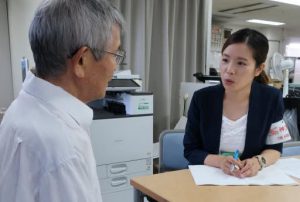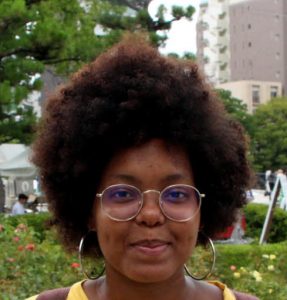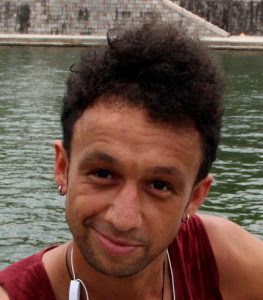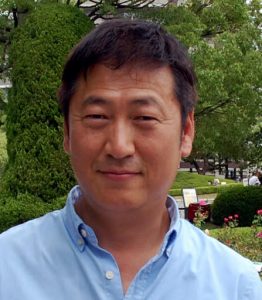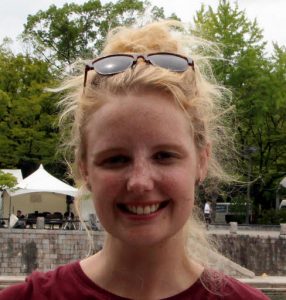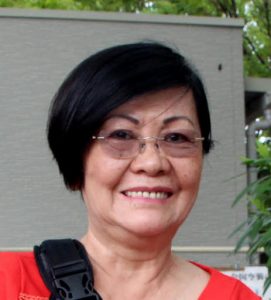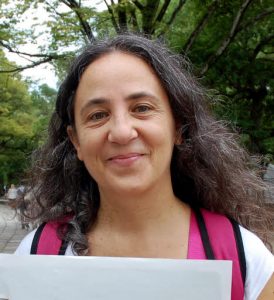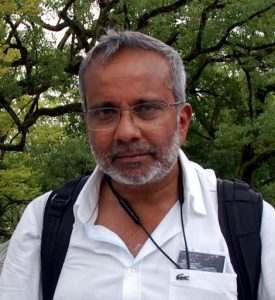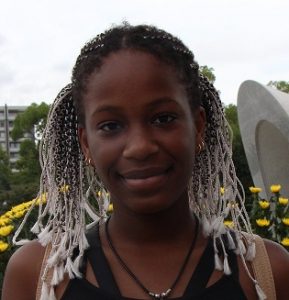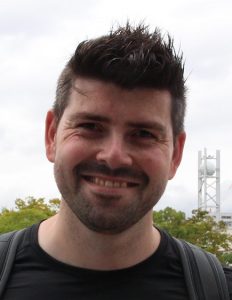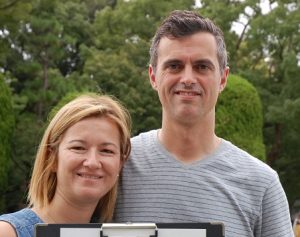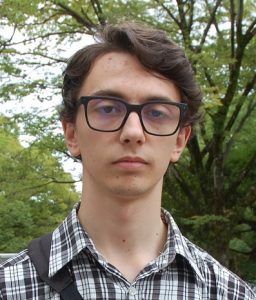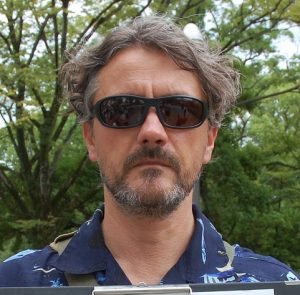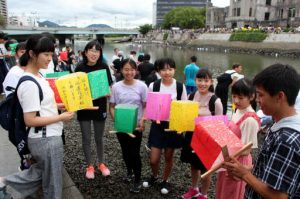Junior Writers Reporting: Junior writers interview visitors to Hiroshima Peace Memorial Park on August 6
Aug. 12, 2019
On August 6, the 74th anniversary of the atomic bombing of Hiroshima, an attack carried out by the United States, a large number of people attended the annual Peace Memorial Ceremony with hopes that a world without nuclear weapons will be realized. The junior writers of the Chugoku Shimbun interviewed people from other parts of Japan and from nations overseas who were visiting the Peace Memorial Park in the city center. The questions included why they came to the city of Hiroshima on August 6 and what their thoughts and feelings were on this day.
Accompanying reporter for regional newspaper
The City of Hiroshima maintains a program of inviting reporters from local newspapers in different parts of the country to visit Hiroshima. This year, the program began on July 28 and ran for 11 days. During this time, the participating journalists listened to the accounts of A-bomb survivors and learned about efforts to hand down the A-bomb experiences. The junior writers accompanied Midori Ishikawa, 31, of the Kobe Shimbun, as she gathered information for her report.
Seiji Yamamura, 77, attended the Peace Memorial Ceremony as the representative of the relatives of A-bomb victims in Hyogo Prefecture. Ms. Ishikawa took photos of Mr. Yamamura while he offered a prayer in front of the Cenotaph for the A-bomb Victims in the rain. Two years ago, Mr. Yamamura underwent surgery for cancer. Asked by Ms. Ishikawa about his thoughts on the elimination of nuclear weapons, he said, “It is important not to forget the wishes of those who died and never give up.” Ms. Ishikawa included these words in her report.
Through this program for journalists, Ms. Ishikawa learned that the Peace Memorial Park was once a vibrant neighborhood where many people lived. Walking through the park, she realized keenly that the beautiful park was once a place where many people lived their lives, and she came to reflect on the preciousness of what was lost.
Expressing her aspirations for her work in the future, Ms. Ishikawa said, “I want to write articles that enable readers to feel that peace activities and the situation involving nuclear weapons in the world are things that are connected to their own lives. I also want to find common elements between reports on these issues and those that cover the major earthquake that struck Kobe in 1995.”
Comments from eight visitors from overseas
The junior writers interviewed international visitors in the park, including those who attended the Peace Memorial Ceremony. Our questions included their reason for visiting Hiroshima, what their impressions of Hiroshima were, and what they could do to help promote peace in the world. Here are what eight of them had to say.
Francy Cauli, 24, France
As I have learned about Japanese culture, I knew that August 6 is an important day. I think it’s important to learn about and understand the history of the suffering caused by the atomic bombing. All countries should hold an event like the Peace Memorial Ceremony.
Gary Germain, 32, Spain
I drew the Atomic Bomb Dome in my sketchbook to capture what I experienced in Hiroshima. If we convey peace over anger, and engage in discussion over conflict, I feel confident that a tragedy caused by nuclear weapons won’t happen again.
Park Sanggyu, 47, South Korea
Standing in front of the Children’s Peace Monument, I felt very sad that the atomic bomb took the lives of innocent children. We should be kind to each other so that the horrors of war will not be repeated.
Lauran Bailey, 28, the United Kingdom
I felt very emotional as I don’t want what happened in Hiroshima to ever happen again. To help promote peace, it’s important to be kind and respect others, to talk instead of fight.
Felisa Tan, 66, the Philippines
I have heard a lot about the atomic bombing of Hiroshima. I’m happy to see that the city has been rebuilt and people have moved forward. We should teach our children the importance of loving each other regardless of race.
Valentina Favata, 50, Italy
I wanted to be in Hiroshima on the anniversary of the atomic bombing. When I attended the Peace Memorial Ceremony, I was overwhelmed and had strong emotions. I remember the words of a survivor: All that visit Hiroshima are witnesses of the sufferings caused by the atomic bombing.
Malik Mendis, 55, Sri Lanka
My long-cherished dream of visiting Hiroshima on August 6 has finally come true. To realize world peace, nuclear weapons must never be used. Peace can be built by not excluding other human beings in the world.
Nikita Petrachkov, 36, Russia
I attended the Peace Memorial Ceremony for the first time and I realized that the atomic bombing was a tragedy that must not be repeated. To help build a peaceful world, I should live as a good person and show others a good example.
Students from Ishinomaki float lanterns, learn importance of handing down experiences
On the evening of August 6, paper lanterns were floated on the Motoyasu River, which flows in front of the Atomic Bomb Dome. Relatives of victims and visitors watched the colorful lanterns float down the river. Among them were nine third-year junior high school students from Ishinomaki, Miyagi Prefecture. They were visiting Hiroshima as part of their peace studies program.
Shin Takeyama, 15, wrote on his lantern: “May nuclear weapons be eliminated and the world be more peaceful.” He said that he saw personal belongings and photos of victims at the Peace Memorial Museum for the first time. “The real items have a strong impact. I want to tell my family members and friends how terrible nuclear weapons are,” he said.
Some of the students thought of their hometown, which was severely damaged by a major earthquake and tsunami on March 11, 2011. Rana Sakurai, 14, said that she and her mother were almost swallowed up by the tsunami. The familiar sight of her hometown completely changed in an instant.
Eight years have passed since the disaster, and her town is recovering from the damage. But she said, “I think that people are starting to forget what happened. I’ve learned from people in Hiroshima that it’s important to hand down our experiences.” She said that she will make a presentation about her experience in Hiroshima during the cultural festival at her school.
This article was written by the following junior writers: Shiho Fujii, 17, Atsuhito Ito, 16, Haruka Oikawa, 17, Kotoori Kawagishi, 17, Akane Sato, 16, Miki Meguro, 16, Airi Shono, 16, Felix Walsh, 17, Yuri Furohashi, 15, Yui Morimoto, 15, Yurina Yunoki, 15, Yuna Okajima, 14, Hitoha Katsura, 15, Ayu Hayashida, 14, Yuno Nakashima, 13, Shino Taguchi, 13, Chihiro Tawara, 13, and Chihiro Yamase, 13.
(Originally published on August 12, 2019)
Accompanying reporter for regional newspaper
The City of Hiroshima maintains a program of inviting reporters from local newspapers in different parts of the country to visit Hiroshima. This year, the program began on July 28 and ran for 11 days. During this time, the participating journalists listened to the accounts of A-bomb survivors and learned about efforts to hand down the A-bomb experiences. The junior writers accompanied Midori Ishikawa, 31, of the Kobe Shimbun, as she gathered information for her report.
Seiji Yamamura, 77, attended the Peace Memorial Ceremony as the representative of the relatives of A-bomb victims in Hyogo Prefecture. Ms. Ishikawa took photos of Mr. Yamamura while he offered a prayer in front of the Cenotaph for the A-bomb Victims in the rain. Two years ago, Mr. Yamamura underwent surgery for cancer. Asked by Ms. Ishikawa about his thoughts on the elimination of nuclear weapons, he said, “It is important not to forget the wishes of those who died and never give up.” Ms. Ishikawa included these words in her report.
Through this program for journalists, Ms. Ishikawa learned that the Peace Memorial Park was once a vibrant neighborhood where many people lived. Walking through the park, she realized keenly that the beautiful park was once a place where many people lived their lives, and she came to reflect on the preciousness of what was lost.
Expressing her aspirations for her work in the future, Ms. Ishikawa said, “I want to write articles that enable readers to feel that peace activities and the situation involving nuclear weapons in the world are things that are connected to their own lives. I also want to find common elements between reports on these issues and those that cover the major earthquake that struck Kobe in 1995.”
Comments from eight visitors from overseas
The junior writers interviewed international visitors in the park, including those who attended the Peace Memorial Ceremony. Our questions included their reason for visiting Hiroshima, what their impressions of Hiroshima were, and what they could do to help promote peace in the world. Here are what eight of them had to say.
Francy Cauli, 24, France
As I have learned about Japanese culture, I knew that August 6 is an important day. I think it’s important to learn about and understand the history of the suffering caused by the atomic bombing. All countries should hold an event like the Peace Memorial Ceremony.
Gary Germain, 32, Spain
I drew the Atomic Bomb Dome in my sketchbook to capture what I experienced in Hiroshima. If we convey peace over anger, and engage in discussion over conflict, I feel confident that a tragedy caused by nuclear weapons won’t happen again.
Park Sanggyu, 47, South Korea
Standing in front of the Children’s Peace Monument, I felt very sad that the atomic bomb took the lives of innocent children. We should be kind to each other so that the horrors of war will not be repeated.
Lauran Bailey, 28, the United Kingdom
I felt very emotional as I don’t want what happened in Hiroshima to ever happen again. To help promote peace, it’s important to be kind and respect others, to talk instead of fight.
Felisa Tan, 66, the Philippines
I have heard a lot about the atomic bombing of Hiroshima. I’m happy to see that the city has been rebuilt and people have moved forward. We should teach our children the importance of loving each other regardless of race.
Valentina Favata, 50, Italy
I wanted to be in Hiroshima on the anniversary of the atomic bombing. When I attended the Peace Memorial Ceremony, I was overwhelmed and had strong emotions. I remember the words of a survivor: All that visit Hiroshima are witnesses of the sufferings caused by the atomic bombing.
Malik Mendis, 55, Sri Lanka
My long-cherished dream of visiting Hiroshima on August 6 has finally come true. To realize world peace, nuclear weapons must never be used. Peace can be built by not excluding other human beings in the world.
Nikita Petrachkov, 36, Russia
I attended the Peace Memorial Ceremony for the first time and I realized that the atomic bombing was a tragedy that must not be repeated. To help build a peaceful world, I should live as a good person and show others a good example.
Students from Ishinomaki float lanterns, learn importance of handing down experiences
On the evening of August 6, paper lanterns were floated on the Motoyasu River, which flows in front of the Atomic Bomb Dome. Relatives of victims and visitors watched the colorful lanterns float down the river. Among them were nine third-year junior high school students from Ishinomaki, Miyagi Prefecture. They were visiting Hiroshima as part of their peace studies program.
Shin Takeyama, 15, wrote on his lantern: “May nuclear weapons be eliminated and the world be more peaceful.” He said that he saw personal belongings and photos of victims at the Peace Memorial Museum for the first time. “The real items have a strong impact. I want to tell my family members and friends how terrible nuclear weapons are,” he said.
Some of the students thought of their hometown, which was severely damaged by a major earthquake and tsunami on March 11, 2011. Rana Sakurai, 14, said that she and her mother were almost swallowed up by the tsunami. The familiar sight of her hometown completely changed in an instant.
Eight years have passed since the disaster, and her town is recovering from the damage. But she said, “I think that people are starting to forget what happened. I’ve learned from people in Hiroshima that it’s important to hand down our experiences.” She said that she will make a presentation about her experience in Hiroshima during the cultural festival at her school.
This article was written by the following junior writers: Shiho Fujii, 17, Atsuhito Ito, 16, Haruka Oikawa, 17, Kotoori Kawagishi, 17, Akane Sato, 16, Miki Meguro, 16, Airi Shono, 16, Felix Walsh, 17, Yuri Furohashi, 15, Yui Morimoto, 15, Yurina Yunoki, 15, Yuna Okajima, 14, Hitoha Katsura, 15, Ayu Hayashida, 14, Yuno Nakashima, 13, Shino Taguchi, 13, Chihiro Tawara, 13, and Chihiro Yamase, 13.
(Originally published on August 12, 2019)

